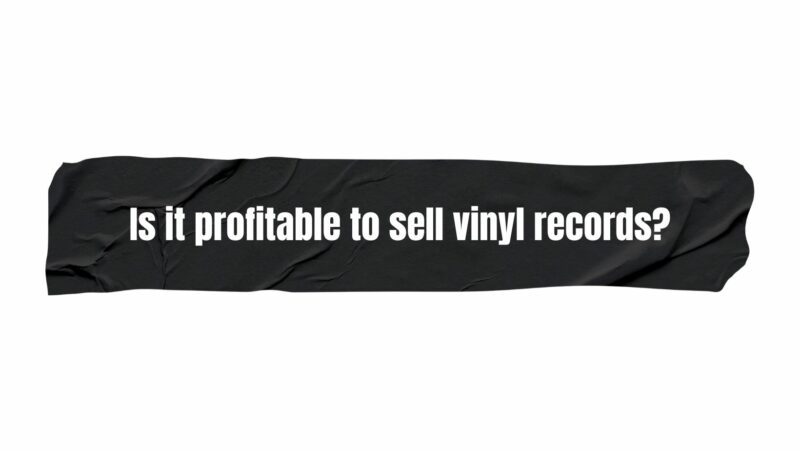The resurgence of vinyl records in recent years has sparked a renewed interest in analog music consumption. For music enthusiasts and collectors, this trend has opened up the opportunity to turn their passion for vinyl into a potential source of income. However, the question of whether selling vinyl records is truly profitable remains a complex one. In this article, we will explore the various factors that contribute to the profitability of selling vinyl records, examining both the potential benefits and challenges that sellers might encounter along the way.
The Pros of Selling Vinyl Records
- Rising Demand
One of the primary drivers of the vinyl resurgence is the growing demand for physical music formats with a nostalgic appeal. As more individuals seek the unique experience of vinyl playback, the demand for vinyl records continues to rise. This demand can translate into potential buyers for your collection, increasing the likelihood of profitable sales.
- Collectible Nature
Vinyl records hold a special place in the hearts of collectors. Records from iconic artists, limited-edition releases, and records with historical significance can fetch premium prices due to their collectible nature. If you possess rare or sought-after records in good condition, you may be able to command higher prices, resulting in profitable sales.
- Niche Markets
Certain genres, artists, and albums have dedicated fan bases that are willing to pay a premium for vinyl records. Niche markets, such as jazz, classical, and underground genres, can present opportunities for sellers to tap into a targeted audience that values the authenticity and tactile experience of vinyl records.
- Investment Potential
For some, selling vinyl records can be seen as an investment opportunity. Just as art appreciates in value over time, certain vinyl records—especially those from iconic artists or albums with historical significance—can increase in value as they become more scarce. By carefully curating your collection and keeping an eye on market trends, you might be able to capitalize on the investment potential of vinyl records.
- Personal Fulfillment
Selling vinyl records isn’t solely about financial gain; it can also bring personal fulfillment. Sharing your passion for music and contributing to the enjoyment of fellow enthusiasts can be rewarding in its own right. Connecting with buyers who share your appreciation for vinyl can create a sense of community and camaraderie.
The Cons of Selling Vinyl Records
- Initial Investment
While selling vinyl records can potentially be profitable, it’s essential to recognize that building a collection for resale requires an initial investment. Sourcing quality records, maintaining their condition, and curating a collection that appeals to buyers can involve significant costs.
- Fluctuating Market
The vinyl market, like any other market, experiences fluctuations. Demand for specific genres or artists can change over time, impacting the resale value of records. Staying updated with market trends and being adaptable to shifts in demand is essential to maintain profitability.
- Condition and Rarity
The profitability of selling vinyl records often hinges on factors like condition and rarity. Records in excellent condition and those that are considered rare or unique tend to command higher prices. However, not all records will meet these criteria, and selling records with lower condition or lesser demand can be more challenging.
- Time and Effort
Selling vinyl records requires time and effort. This includes researching market values, cataloging records, creating listings, packaging items securely, and managing customer interactions. The time invested in these activities can impact the overall profitability, especially for individuals looking for quick returns.
- Competition
The increasing popularity of vinyl records has led to a more competitive marketplace. Numerous sellers are vying for the attention of buyers, which can lead to price wars and lower profit margins. Standing out amidst the competition requires strategic pricing, effective marketing, and unique offerings.
Conclusion
The profitability of selling vinyl records depends on a combination of factors, including the condition of the records, their rarity, market demand, your investment strategy, and your dedication to the endeavor. While selling vinyl records can yield financial gains, it’s essential to approach it with a realistic understanding of the challenges and opportunities involved. Building a successful venture around selling vinyl records requires careful planning, a passion for music, a willingness to adapt to market trends, and a commitment to delivering value to buyers. Whether you’re seeking additional income or aiming to share your love for vinyl with others, the journey can be both rewarding and fulfilling when approached with the right mindset.


